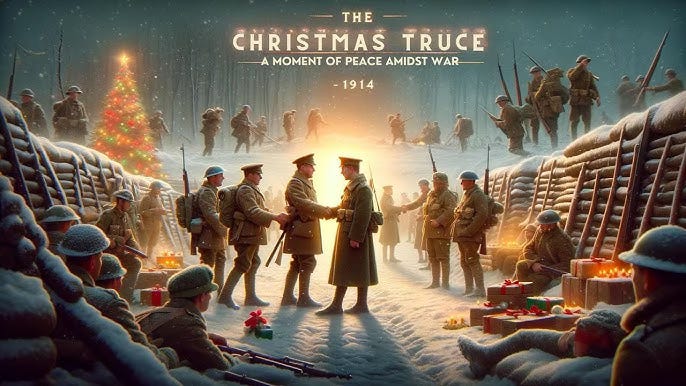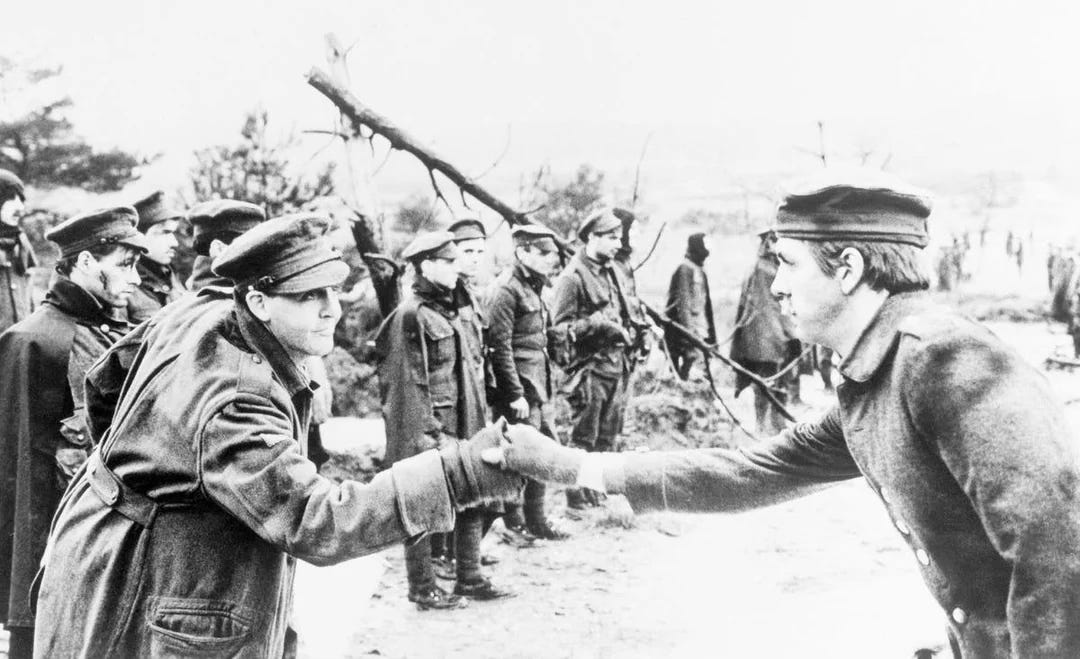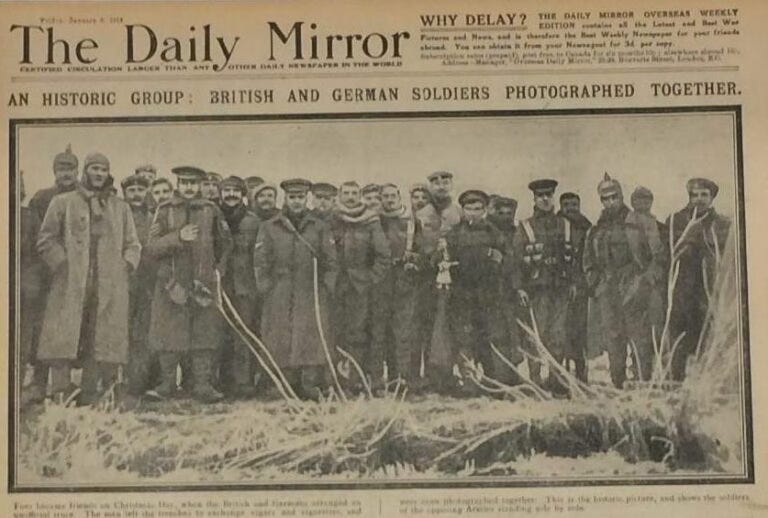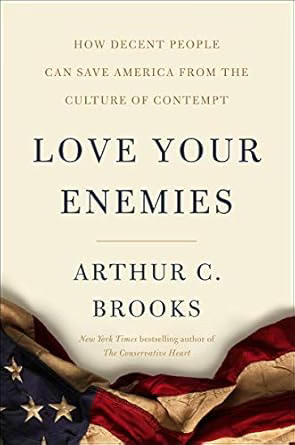The Real Enemy Isn’t Each Other
What the Christmas Truce of 1914 Teaches Us About Today’s Divisions.
On Christmas Eve, 1914, in the frozen trenches of World War I, where the British and German soldiers had been firing at one another for weeks, a remarkable moment unfolded.
They began to hear something unexpected drifting through the night air. Singing. Christmas songs, to be specific. On one side, German voices sang Silent Night, triggering a response from across the battlefield, where British troops began singing carols of their own.
Soon, men who were sworn enemies laid down their rifles… climbed cautiously out of the trenches… and met in the barren stretch.
I can only imagine what it was like.
They began sharing food and playing soccer. And eventually, even exchanged small gifts.
What a scene it must have been. For one brief night, in the middle of one of history’s bloodiest wars, humanity triumphed over hate and hostility.
The truce did not end the war. The fighting resumed the next day. But the memory of that night has endured for well over a century—not because it solved the conflict, but because it revealed what is possible when people choose connection over division, kindness over suspicion, and courage over fear. And… that we have more in common as humans — as people of this Earth than we realize.
While our world today is not a battlefield of soldiers, the trenches of division often feel just as deep and divisive. Families are fractured, communities are split apart, and political battles continue to harden our hearts. Yet, just like those soldiers, we too can find common ground—sometimes in the smallest acts of listening, kindness, or respect. Unity does not erase differences, but it can transform them into the ground on which hope grows.
Arthur Brooks, writer of the 2019 book Love Your Enemies: How Decent People Can Save America from the Culture of Contempt, argues that contempt is the real issue at play. It is the true source of America’s political polarization and social decay.
Brooks clarifies that anger is a pretty normal and healthy emotion when you feel something unjust is happening. Contempt, however, is a deeper and more destructive emotion. It occurs when anger is combined with disgust, leading to a dehumanizing belief that a person who disagrees with you is beneath consideration and unworthy of respect. I’m at the beginning of this book and look forward to learning more about our contempt. But I think it’s worth rereading that statement, because dehumanizing other people makes it easy to allow terrible things to happen to fellow humans.
All this engenders polarization, damaged relationships, and personal unhappiness. Brooks says, “We’re addicted to contempt.” Just as any addict is addicted to a drug, we are addicted to contempt. And the more we scroll, the more dopamine is triggered, feeding our addiction to contempt.
The media outlets and politicians understand this all too well. They have become like drug dealers feeding our addiction. The more we are glued to the screens, the more money they make, and the more power politicians maintain.
If, and when, we pause our social media time, the screen pushers are waiting for us to return. Just like the drug dealer is waiting for his best customer to start jonesing for the drug. For a drug addict, all it takes is one tiny snort, smoke, or drink, and the game is back on. For contempt addicts, all it takes is one peep. You know… just a quick look to catch up on the world. I’ll bet you’ve tried and experienced this. We tell ourselves, I’m only going to check on the latest news, so that I can stay abreast of current events.
What happens?
Yep, you’re back to doom-scrolling in a matter of days, perhaps hours. Just like an addict is back on the merry-go-round of insanity.
It’s hard to admit, but it’s real, isn’t it? And research has proven it by showing us how our brains respond to social media activity, triggering the release of dopamine. When that happens repeatedly for years, it’s not good.
I want to be clear that it’s more complicated than this, involving many layers. But I think it’s important to note that this is the essence of it all.
This essay is not about contempt addiction.
It’s about the fact that we have more in common than we realize, but we need to understand and have the awareness of how we’re being played or taken advantage of — and how the media and politicians have struck a chord to make more money and maintain power, resulting in us attacking each other. Divide and conquer is an old Russian Communist model, and that’s exactly what’s going on here.
What can we do?
The first step is awareness. Awareness that, perhaps, only perhaps, we’ve been living with contempt, which is more than just anger and disagreements. Secondly, be aware of the fact that we’re being played by the media and politicians. They toss the bait out — we latch on to it.
I know that I’m guilty of it.
It was refreshing for me to see Author Brooks’ perspective on contempt. It makes perfect sense to me.
So now — what?
First, make a decision about my social media intake. For the most part, I’ve been off of Facebook for about a week or so. And, guess what? I’m happier! LOL. I’m also being more careful with my news monitoring, spending less time reading and scrolling. I am exploring new news sources, always making sure that I’m getting my news from many different outlets, no longer relying on the old, tried and true ones that I used to depend on.
Secondly, as I go through my day, I am mindful of what’s behind the curtain with the media and politicians. It certainly revolves around power and money.
Then, we’re ready to look at the issues that affect each of us, most of which we can agree on.
Recently, I posted my political beliefs on Facebook. As you know, it’s a toxic environment for division, hate, and contempt. But, in my post, I proved that we have more in common than not.
When I posted, my friends on the opposite side of the aisle, so to speak, said I believe the same way. One even said, “I hate to admit it, but that’s exactly how I feel.” But you’d never know it by our posts and conversations. Never in a million years.
Think about this: Some of the topics we see on the news are about trans people taking over sports. With all of the coverage and outrage, I began to think that there are hundreds, even thousands, of trans athletes out there — and in our schools, contaminating the minds of our kids. But no. It amounted to about 1%. I think the entire state of Maine had only two. Some states, zero. But with all of the news coverage, you would have thought it was many thousands of kids. I know I thought it was much higher than 1%, which is another example of media and politicians magnifying an issue for ratings or power.
Let’s look at our commonalities.
Let’s take a look at what we ALL care about, regardless of political affiliation.
Inflation. I think we can all agree that high inflation is never good.
Cost of food and goods: We all want our groceries, cars and home goods to be as cheap as possible.
Cost of housing. This is a no-brainer.
Cost of Prescription drugs. Also, a no-brainer, especially when the pharmaceutical companies charge outrageous amounts for basic drugs.
We don’t want waste in the Government: Why would anyone want waste?
Affordable health care: We all certainly want good healthcare that is reasonable. Unfortunately, I’ve been told that ours is going up.
Federal budget deficit: I had never really understood this completely, but I have recently been educated on this by a financial analyst, and it’s NOT good for a country to have too much debt. Just like out-of-control personal debt isn’t good.
We care about the elderly and handicapped: I think we can all agree on that. However, some of us care more about it than others, meaning more or less funds directed to this area. But, in general, I think we can all agree that we should care for our elderly and handicapped friends and neighbors and their children.
Childcare: We all want to have good, safe, and healthy childcare in our communities.
Good schools: We all want good schools in safe environments.
Opportunity: We all want an environment where we can excel, whether it’s in school, business, or a start-up. Often, small startups need cash and capital. I’m all for helping them get started. It also stimulates the economy with jobs and taxes.
We’re focused on the wrong 1%.
I love what James Talarico from Texas says, “We’re focused on the wrong 1%.” In other words, the media and politicians have baited us against each other, related to the 1% of trans, 1% Muslims, 1% illegal immigrants, and so on. He says that all of the main topics and issues presented to us related to trans, religion, and immigration only add up to about 1% respectively.
When in reality, it’s the 1% of the oligarchs that we should be mad at. Teachers are paying a higher percentage in taxes than most billionaires. Many billionaires aren’t paying ANY taxes.
How is that right?
He says, “They divide us by party, by race, by gender, by religion, so that we don’t notice that they’re defunding our schools, gutting our health care, and cutting taxes for themselves and their rich friends. Divide and conquer. It is the oldest communist Russian strategy in the world.”
I think he’s on to something.
“So their social media algorithms tear us apart. Divide us by party, race, gender, religion, so that we don’t know all that they are doing.”
He also says that the biggest divide is not left vs right but top vs bottom. The ultra-rich vs everyone else. Billionaires want us looking left and right so that we’re not looking up at them. The people were so hard to keep us divided because we’re a threat to their wealth and power.
So… what can we do? First of all, a divided country doesn’t heal because of one person—it heals when each of us decides to lead in small ways. To initiate small conversations that connect us, get us talking about the issues we have in common.
Think back to the 1914 truce I started with. A familiar sound echoed in the night, lighting up the opposition with calm, peace, and connectiveness.
Practical steps as only a beginning
We need to begin with what we would want: Respect, to be listened to, and heard. Often, we don’t feel like we’re heard, creating more frustration, more anger.
There are so many things that can be said about this issue, and maybe I will at some point. But for now, there are a few things each of us can do, even in small ways.
Be kind. When we’re stirred up emotionally, it’s easy to forget.
Tell someone from “the other side” what you admire about them.
Listen without interrupting.
Earnestly seek to understand their point of view. Ask questions like you really want to understand what’s behind their beliefs. “Why” do they think of it that way? It’s hard to do and takes a lot of patience, but it really helps both parties. And it helps me understand what makes them tick, related to that issue. PLUS, it causes them to think critically about the issue, which is often lacking in many people. Basically, ask questions that require them to dig deep. Then it also requires you to get in touch with the “why” of your beliefs.
All of this is only a beginning. It’s easy to forget that we’re all in this together, especially when we have people on the big screens and small screens telling us how stupid, criminal, or crazy the other side is. But we must remember their biggest motive: Power and money.
Try an experiment next time you’re on your favorite news outlets. This goes for all sides of the political spectrum.
Pause.
Explore to see if there are any motives behind it. Behind the curtain. Will this get people angry? Does it make me angry? Is it full of hate? Is it trying to turn me against my neighbors? Remember: It does not mean you change ANY BELIEF ON ISSUES. Simply, explore for yourself to see if there might be more going on than it appears. That’s all.
Ask yourself: Are my feelings of anger and disagreement — or are they contempt? There’s a difference, and this is critical for this process. Anger and disagreement — or contempt. I’ll post more about contempt later on.
I’d be interested in hearing your comments on this. Please add your thoughts in the “leave a comment” below.
Another story related to oppositions finding common ground.
One Black Man's Desire to Understand Another's Ideology Led 200 KKK Members to Hang Up Their Robes.
What’s commonly known as the Saint Francis Prayer, or Peace Prayer, has a wonderful line in it: “Grant that I may seek, first, to understand, rather than to be understood.”








Eddie, this is so good!
I am sharing this in the hope that more people will read it. This is so beautifully written to bring
unity in our divisive country.
I appreciate your genuine heart.
By the way, I never knew of the Christmas Truce of 1914. That is so powerful.
Eddie, your vivid depiction of the 1914 Christmas Eve truce truly resonated with me. It’s a powerful reminder that even in the most entrenched conflicts, humanity has this incredible capacity to find common ground. What strikes me is that it wasn’t some grand diplomatic gesture that brought those soldiers together, but a simple, shared melody and the courage to step out of their trenches. In our current landscape, where the trenches of division often feel just as deep, it’s easy to feel overwhelmed by the sheer scale of the issues. But your essay beautifully underscores the idea that healing doesn’t always start with sweeping policy changes or viral movements. Sometimes, it begins with those "small acts of listening, kindness, or respect" you mentioned. I’ve been trying to apply this in my own life, pausing before I react to a polarizing news story or seeking to understand a friend’s perspective that differs from my own. It’s not always easy, and sometimes I stumble, but the potential for connection, even in a small way, feels like a beacon of hope.